WhatsApp has cemented itself as one of the most widely used messaging platforms globally, with over 2 billion monthly active users as of 2022 (Source: Backlinko).
Given WhatsApp's enormous user base and preference as a communications channel, it presents a lucrative opportunity for customer service.
By meeting customers where they already spend significant time, brands can nurture closer engagement.
Recent surveys reveal 76% of consumers expect to message a business in the same way they do friends and family (Source: Twilio).
Integrating messaging platforms like WhatsApp with existing business systems enables seamless, swift customer support.
WhatsApp Business solution adoption has already accelerated over 80% year-over-year (Source: VentureBeat), exemplifying the channel's versatility for scalable service.
With CRM, chatbot and agent messaging capabilities, WhatsApp facilitates quality assistance on demand.
Continue reading to know more about WhatsApp as a customer support channel.
What is WhatsApp as a Customer Support Channel?
WhatsApp has evolved from being a simple messaging app to a powerful tool for businesses to engage with their customers.
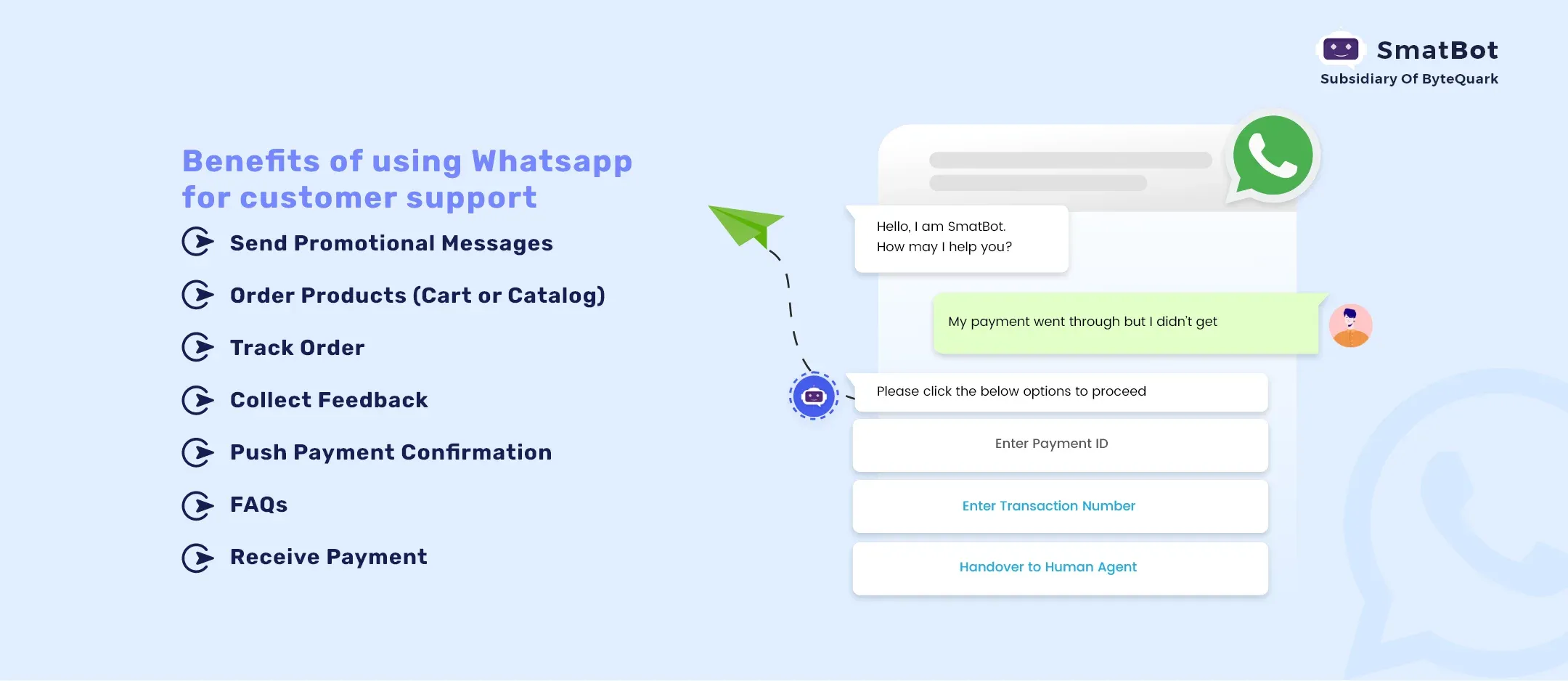
It allows businesses to provide efficient and effective customer support through real-time messaging.
With over 2 billion active users, it's no wonder that WhatsApp has become a preferred channel for customer interaction.
Benefits of using WhatsApp for support
Using WhatsApp for support offers several benefits for businesses and customers alike. Here are some key advantages:
Convenience and Accessibility
WhatsApp is a widely-used messaging platform, and most customers already have it installed on their smartphones.
This makes it highly accessible for users to reach out to businesses without the need for additional apps or channels.
Real-time Communication
WhatsApp provides instant messaging, allowing businesses to respond to customer queries in real time.
This enhances the customer experience and reduces waiting times, leading to higher satisfaction levels.
Global Reach
WhatsApp is used globally, making it an excellent tool for businesses to connect with customers across different countries and time zones, expanding their market reach.
Multimedia Support
Businesses can send multimedia messages, including images, videos, and documents, through WhatsApp.
This feature is beneficial for providing visual assistance or sharing instructional content with customers.
Personalization
WhatsApp allows businesses to address customers by name and maintain personalized conversations. This personal touch can lead to stronger customer relationships and brand loyalty.
Cost-effective
Compared to traditional customer support channels like phone calls, WhatsApp support is generally more cost-effective, especially for international communications.
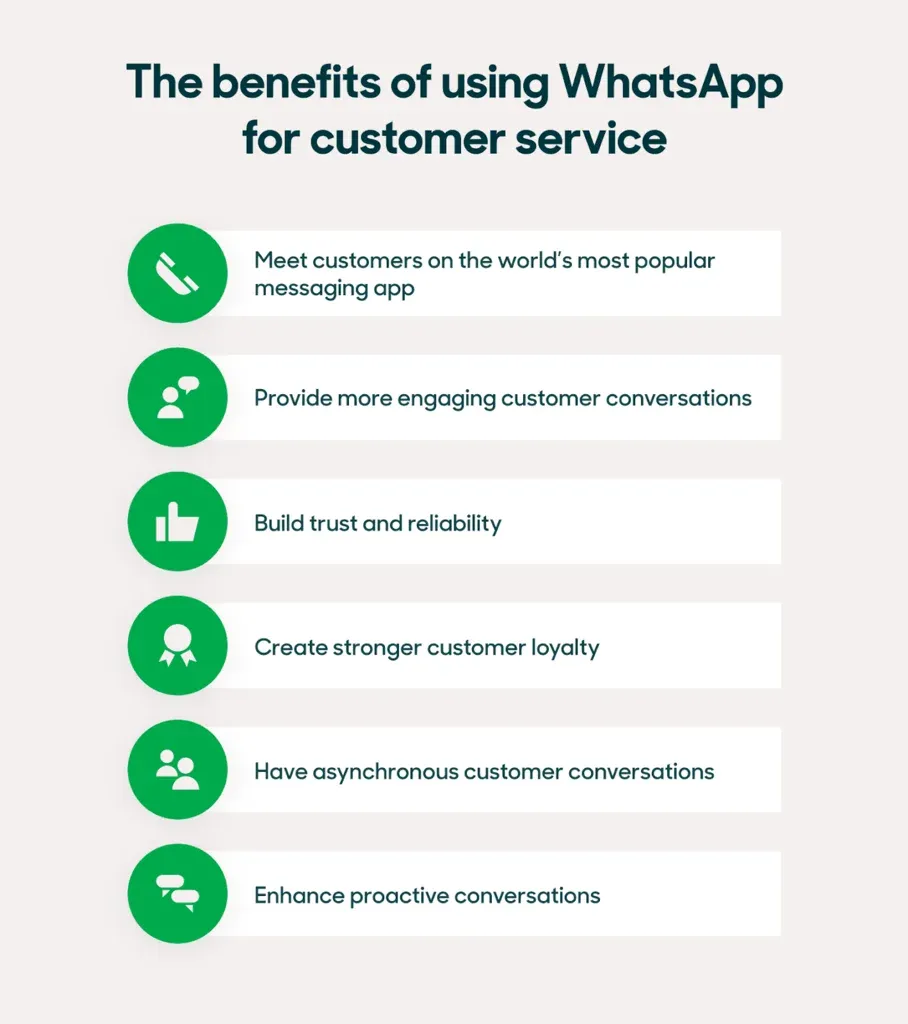
Quick Issue Resolution
With the ability to share multimedia and gather information easily, businesses can efficiently troubleshoot issues and provide solutions faster.
Automated Responses
Businesses can use WhatsApp bots or automated responses to handle common queries and direct customers to relevant resources. This can further streamline the support process.
Feedback and Surveys
Companies can use WhatsApp to collect feedback and conduct customer surveys. It would help them gather valuable insights to improve their products and services.
Two-Way Communication
WhatsApp allows businesses to initiate conversations with customers and vice versa. This opens up opportunities for proactive support, updates on orders, and other relevant information.
Security and Privacy
WhatsApp offers end-to-end encryption, ensuring that customer data and interactions are secure and private, which is essential for building trust.
Integration with CRM Systems
Many businesses integrate WhatsApp support with their CRM (Customer Relationship Management) systems, enabling better tracking, organization, and analysis of customer interactions.
How to Set Up WhatsApp for Customer Support
Setting up WhatsApp for customer support involves a few steps. Here's a general guide to help you get started:
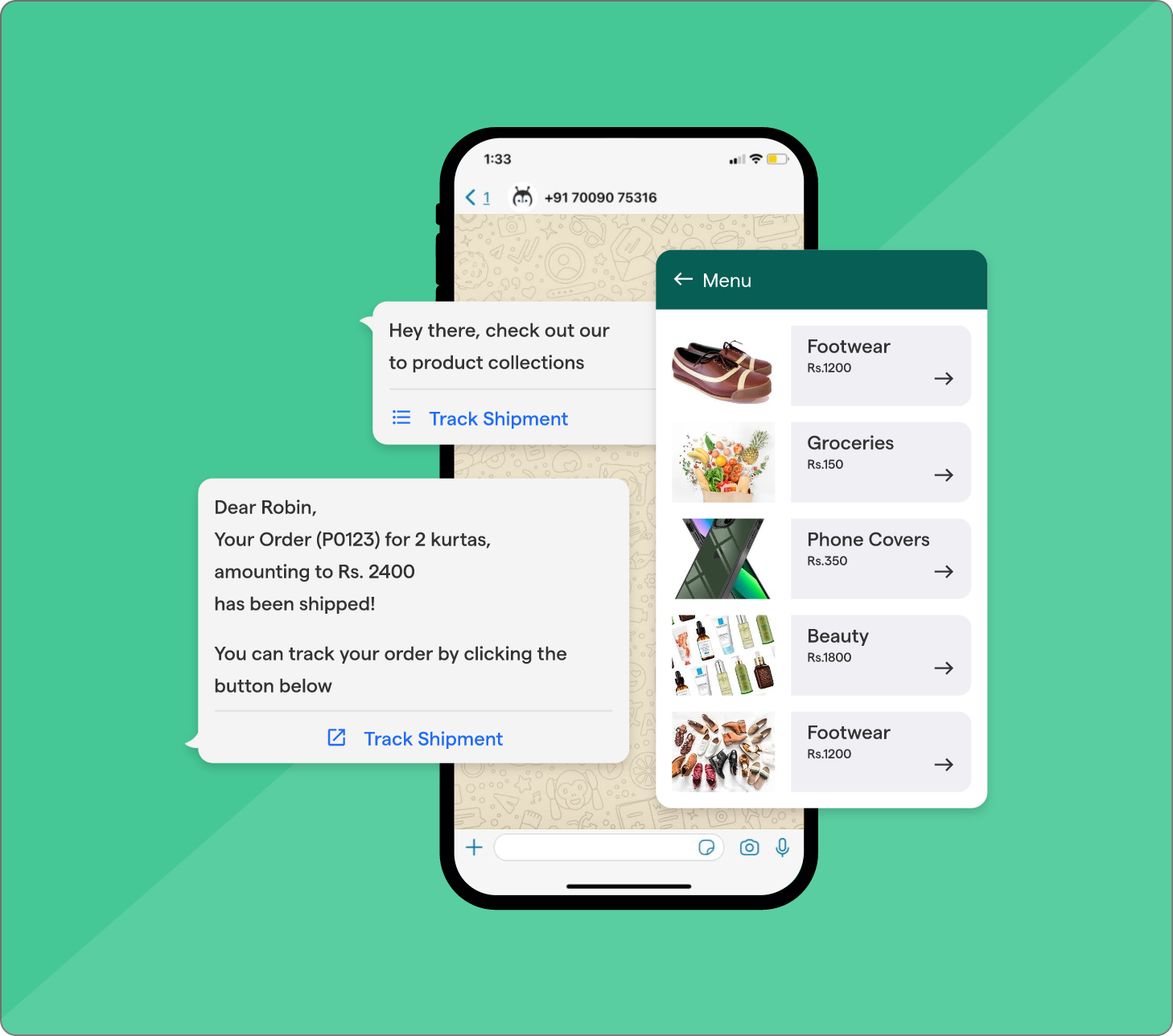
Step 1
Registering a WhatsApp Business Account
To use WhatsApp for business purposes, you need a WhatsApp Business Account.
This account provides you with access to various business features and enables you to interact with your customers seamlessly.
Download the WhatsApp Business app from the Google Play Store or Apple App Store and follow the registration process to create your account
Step 2
Configuring Customer Support Features
Once you have your WhatsApp Business Account, it's time to customize it for customer support. Here are a few key features to configure:
Step 3
Customizing Business Profile
Create a compelling business profile that includes important details such as your business name, logo, contact information, and a brief description of your offerings.
A well-crafted profile helps customers recognize your business and establishes credibility.
Step 4
Enabling Automated Greetings and Quick Replies
Take advantage of automated greetings and quick replies to provide instant responses to common customer queries.
Set up automated welcome messages to greet customers when they initiate a conversation, and create quick replies for frequently asked questions.
This saves time and ensures consistent and efficient communication.
Step 5
Setting Up Frequently Asked Questions (FAQs)
Compile a list of frequently asked questions and their answers. This resource will come in handy when customers seek information about your products, services, or policies.
Organize your FAQs into categories and create pre-defined responses to address these inquiries swiftly.
Step 6
Integrating Chatbots for Automated Assistance
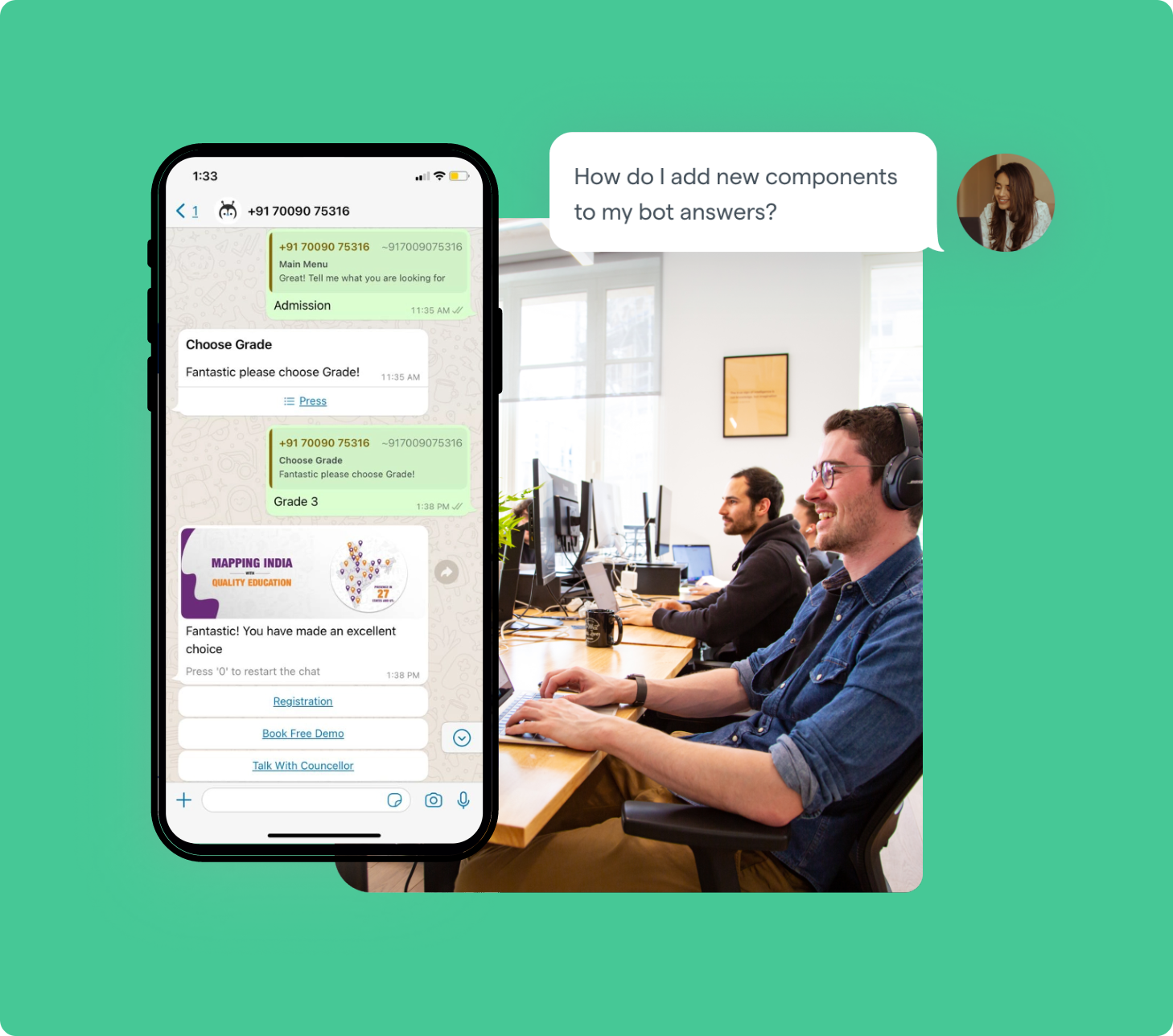
Consider integrating chatbots to handle routine inquiries and provide automated assistance.
Chatbots can help answer simple queries, guide customers through basic troubleshooting steps, or direct them to relevant resources.
This enables faster response times and frees up your support agents to focus on more complex issues.
Best Practices for Using WhatsApp as a Customer Support Channel
To ensure effective and efficient customer support using WhatsApp, here are some best practices to follow:
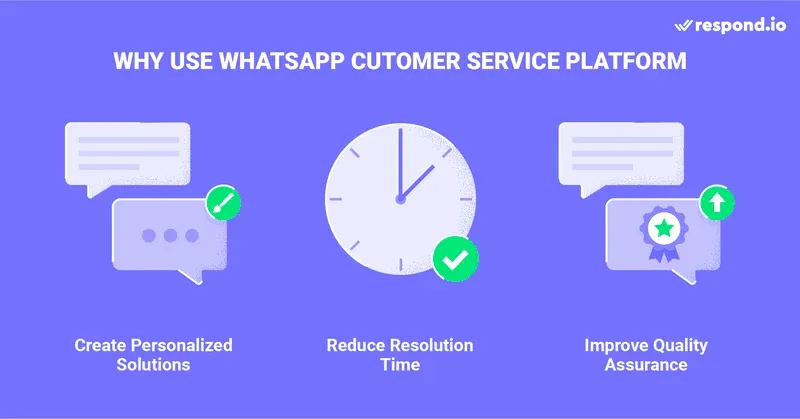
Prompt and Professional Responses
Respond to customer inquiries promptly, ideally within a few hours or less. Swift responses demonstrate your commitment to customer satisfaction and build trust.
Additionally, maintain a professional tone in your messages and ensure clarity in your response
Personalization and Contextualization
Make customers feel valued by personalizing your interactions. Address customers by their names and use the context of their previous conversations to provide tailored support.
This personal touch goes a long way in enhancing customer satisfaction and loyalty.
Proactive Communication
Don't wait for customers to reach out to you; take the initiative to proactively communicate with them.
Send order updates, shipping notifications, or relevant product information to keep customers informed and engaged.
Proactive communication demonstrates your dedication to providing a seamless customer experience.
Tips for Optimizing WhatsApp Customer Service
Optimizing WhatsApp customer service involves implementing strategies to enhance efficiency, customer satisfaction, and overall support experience.
Here are a couple of tips to help you achieve that:
Tracking and Analyzing Performance Metrics
Utilize tools and metrics to track the effectiveness of your customer support efforts on WhatsApp.
Monitor response times, customer satisfaction ratings, and other relevant metrics to identify areas for improvement and measure the success of your support operations.
Integrating WhatsApp with Other Support Channels
Offer a seamless omnichannel support experience by integrating WhatsApp with your existing support channels.
Ensure consistency in communication across all channels, allowing customers to switch between channels without losing context.
This integration provides a holistic view of customer interactions and enhances overall support efficiency.
Conclusion
In conclusion, with instant connectivity and personalization capabilities at scale, integrating WhatsApp as part of a cross-channel CX strategy is invaluable.
Even data says 67% of customers state they are more likely to do business with/purchase from a company that they can contact via messaging (Source: Clickatell)
Key features like real-time alerts, canned responses, multimedia sharing and third-party integrations make WhatsApp a versatile customer service ecosystem – especially when unified with internal tools.
Solutions like BotPenguin enable creating AI-powered chatbots on WhatsApp for 24/7 automated assistance with seamless agent handovers.
Empowering consumers to self-serve via conversational BotPenguin WhatsApp bots reduces tickets for repetitive requests.
It facilitates resource optimization for complex queries. Broadcasting valuable content updates and personalized offers helps nurture customer relationships over time.
As per recent surveys, 71% of customers expect phone/messaging support 24 hours a day (Source: Clickatell). Meeting this demand is essential for modern businesses.
With rising preference for messaging, an integrated WhatsApp approach plays a strategic role - enabling round-the-clock availability and support.
It helps brands drive more meaningful engagement through context-aware experiences.
By merging messaging convenience with personal assistance, WhatsApp delivers next-gen customer care.
Frequently Asked Questions (FAQs)
Is WhatsApp suitable for customer support in a small business?
Absolutely! WhatsApp is a versatile platform suitable for businesses of all sizes.
It offers an accessible and cost-effective customer support channel, allowing you to engage with your customers effectively, regardless of the scale of your business.
Is WhatsApp secure for customer support interactions?
WhatsApp incorporates end-to-end encryption, ensuring that the messages exchanged between you and your customers remain private and secure.
However, it's essential to follow best practices and adhere to privacy regulations to maintain data security on your end.
How to use WhatsApp for customer support outside of business hours?
WhatsApp's automated features, such as greetings and away messages, allow you to set expectations with customers regarding your availability.
You can inform them about your business hours and let them know when they can expect a response. This ensures transparency and helps manage customer expectations.
Can you integrate WhatsApp with existing customer support tools?
Yes, you can integrate WhatsApp with other customer support tools, such as CRM systems or helpdesk software.
The integration enables a seamless flow of customer information and interactions across multiple channels, enhancing overall support efficiency and enabling a unified customer experience.
How to handle a high volume of customer inquiries on WhatsApp?
To manage a high volume of customer inquiries, you can leverage automation tools like chatbots.
Chatbots can handle routine and repetitive queries, provide instant responses, and even escalate complex issues to human agents when necessary.
This helps streamline your support operations and ensures efficient handling of customer inquiries


